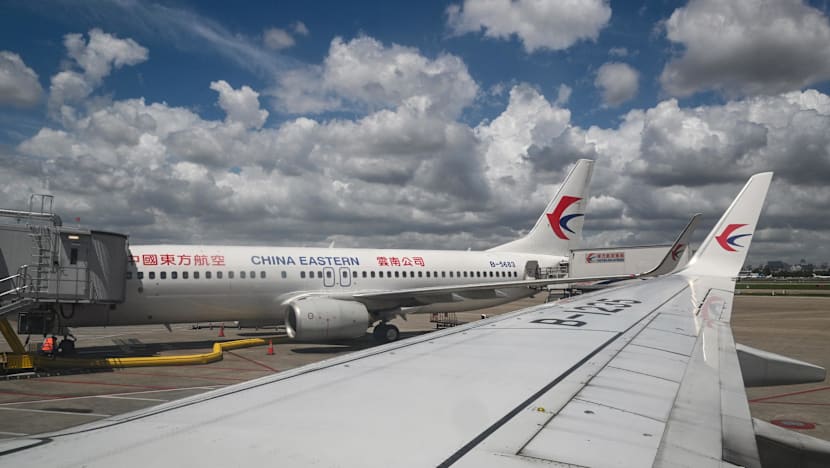491,000 Japan-bound air tickets cancelled as China warns people to avoid travel amid spat
The cancellations amount to roughly 32 per cent of Chinese airlines' total bookings to Japan, said a veteran aviation analyst.

China Eastern Airlines aircraft parked at Shanghai Hongqiao International Airport in Shanghai on Jul 22, 2025. (File photo: AFP/Hector Retamal)

This audio is generated by an AI tool.
Chinese airlines have recorded about 491,000 cancellations of tickets to Japan since Saturday (Nov 15) – roughly 32 per cent of their total bookings to the typically popular destination – after Beijing advised citizens to avoid travelling there amid a diplomatic spat, according to a veteran aviation analyst.
The percentage of flights affected skyrocketed to 82.14 per cent on Sunday and 75.6 per cent on Monday, according to independent analyst Li Hanming, citing his research data covering all mainland China-based airlines.
“The flight-ticket cancellations (on Sunday) were 27 times that of new bookings, which shows safety concerns are the dominating factor for travel,” he said, adding that he had not seen cancellations on such a scale since early in 2020, as COVID-19 infections surged at the tail end of the Chinese New Year travel period.
The spread of the coronavirus resulted in flight capacity into and out of China falling “sharply” around the holiday that year, according to an analysis posted on the World Economic Forum website.
A 71 per cent capacity drop on Feb 17, 2020, over the same date in 2019 was China’s sharpest, it said.
On Friday, after Beijing’s warning to Chinese travellers, airlines offered full refunds for flights to Japan.
China-Japan tensions had escalated over Japanese Prime Minister Sanae Takaichi’s suggestion on Nov 7 that Tokyo could deploy its military forces in the event of a conflict in the Taiwan Strait.
PLA Daily, the People’s Liberation Army’s official mouthpiece, warned on Sunday that Japan risked turning the entire country into a battlefield if it intervened militarily in the Taiwan Strait.
Li said Shanghai-Tokyo and Shanghai-Osaka area flights were most affected by the cancellations. He estimated that total losses from refunded tickets, 70 per cent of which were round-trip, were in the billions of yuan.
John Grant, a senior analyst with British aviation intelligence firm OAG, said Chinese carriers were probably being hit harder than their Japanese peers.
“The China-Japan market is dominated by Chinese-based airlines, with the top five carriers all being based in China, so the likelihood is that this will hurt those carriers more than the Japanese-based airlines,” Grant said.
In a few weeks, airlines would likely see any “significant change” in capacity, Grant said, though signs of a thaw are already visible.
“With Japan apparently seeking to calm China’s current feelings, then it may be a bit of a short-term issue, but equally disruptive to all concerned,” he said.
The three largest state carriers – Air China, China Southern and China Eastern – plus four others issued separate statements on Saturday saying they would allow free ticket refunds or itinerary changes for flights booked until Dec 31.
According to Singapore-based travel marketing and technology firm China Trading Desk, cancellations and rebookings indicated that departures to Japan over the next few weeks were down by more than 30 per cent compared with last week.
And the impact was said to be concentrated in bookings before January.
China was the top source of inbound tourism to Japan in the first nine months of the year, with about 7.49 million people, Japan-based Kyodo News said, citing Japanese government data.
The more than 6.7 million visits by Chinese travellers to Japan logged in the first eight months of 2025 had risen from 4.6 million over the same period last year, according to the Japan National Tourism Organisation.
Chinese often visit Japan because of short flights, cultural attractions and prices affected by a depreciation of the Japanese yen, travel analysts have said.
This article was first published on SCMP.


















